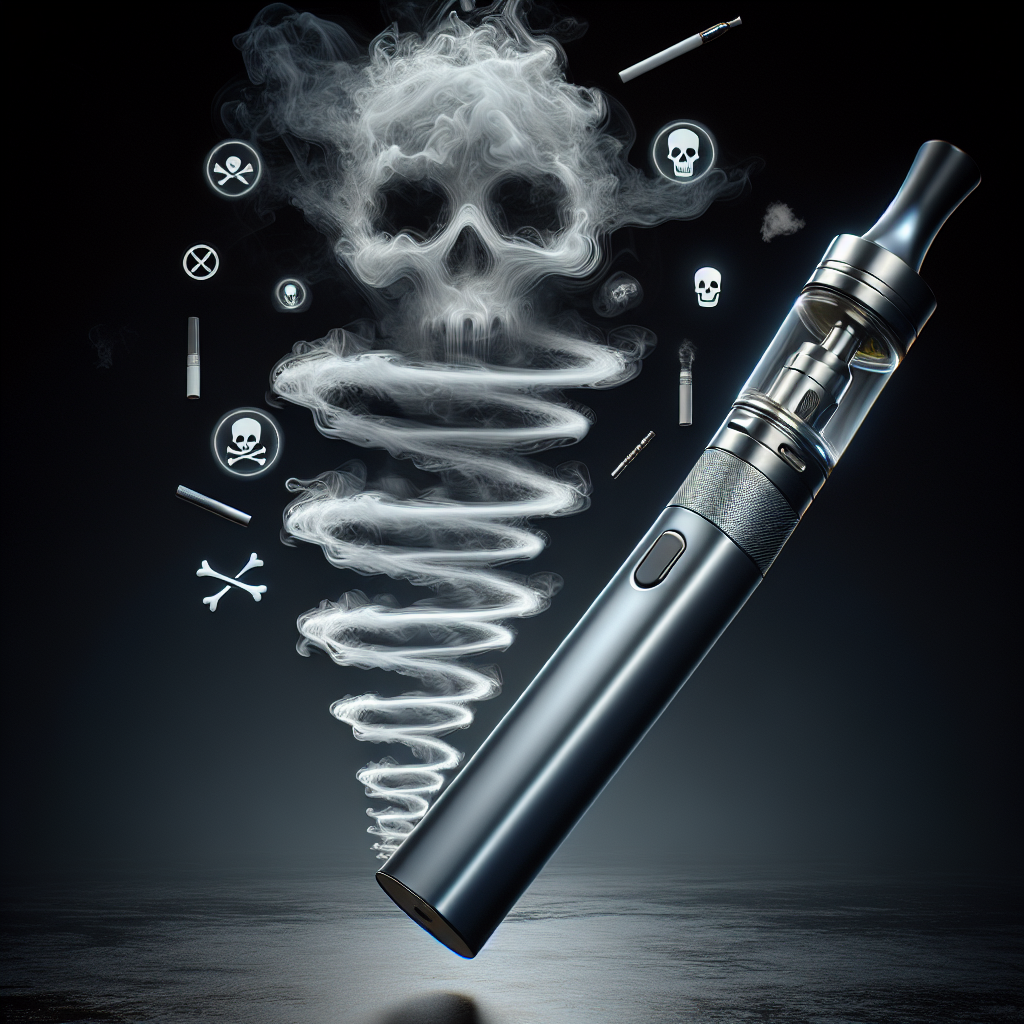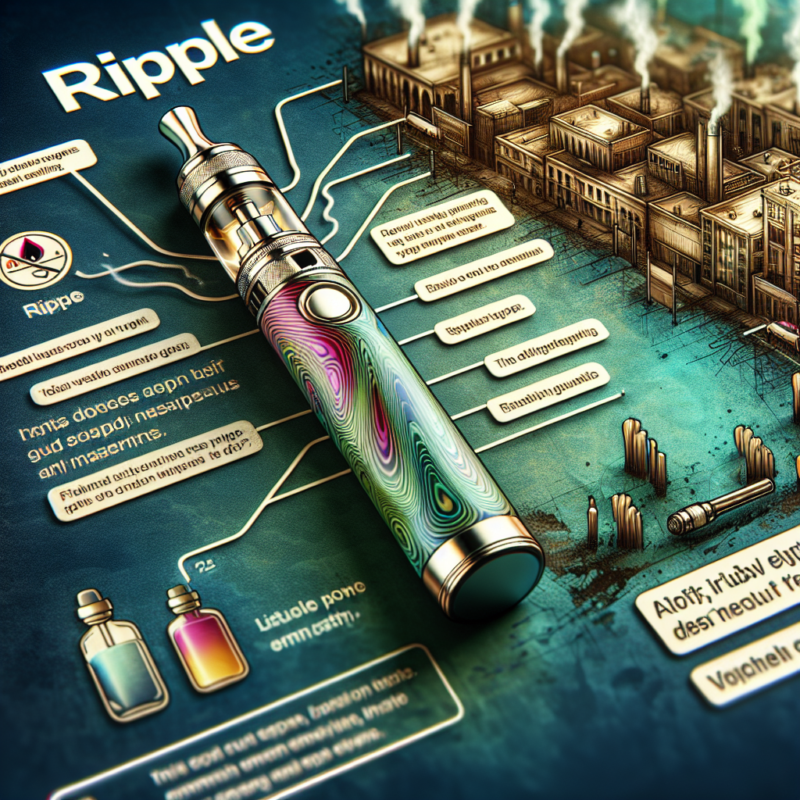Blog
is ripple vape bad for you
The Potential Health Risks of Using Ripple Vape: is ripple vape bad for you?
Is ripple vape bad for you. Vaping has become increasingly popular in recent years, with many people turning to it as an alternative to smoking. One type of vape that has gained attention is the ripple vape, also known as a disposable vape pen. These pens are small, discreet, and easy to use, making them a convenient option for those looking to vape on the go. However, as with any form of vaping, there are potential health risks associated with using ripple vape pens.
One of the main concerns with ripple vape pens is the ingredients used in the e-liquid. While traditional vape juices typically contain a combination of propylene glycol, vegetable glycerin, flavorings, and nicotine, ripple vape pens often use a different type of nicotine called nicotine salts. This form of nicotine is known to be more potent and can lead to a higher addiction potential.
Furthermore, the flavorings used in ripple vape pens may also pose a health risk. Many of these pens come in a variety of flavors, such as fruit, candy, and dessert flavors, which may be appealing to younger users. However, these flavorings often contain chemicals that can be harmful when inhaled, such as diacetyl, which has been linked to a serious lung condition known as popcorn lung.
Another potential health risk of using ripple vape pens is the heating element. These pens use a coil to heat the e-liquid and turn it into vapor. However, the quality of these coils may vary, and some may contain heavy metals such as lead, nickel, and chromium. Inhaling these metals can be harmful to the lungs and may lead to long-term health issues.
Additionally, the lack of regulation in the production of ripple vape pens is a cause for concern. Unlike traditional vape juices, which are subject to strict regulations and testing, disposable vape pens are not held to the same standards. This means that there is no guarantee of the safety or quality of the ingredients used in these pens.
Moreover, the convenience of ripple vape pens may also contribute to potential health risks. These pens are designed to be used and disposed of, meaning that users may not be aware of how much they are vaping. This can lead to overconsumption of nicotine, which can have adverse effects on the body, such as increased heart rate and blood pressure.
Furthermore, the lack of education and awareness surrounding ripple vape pens may also be a contributing factor to their potential health risks. Many people may not be aware of the potential dangers associated with using these pens, and may not take the necessary precautions when using them. This lack of knowledge can lead to unintentional misuse and increase the risk of adverse health effects.
In conclusion, while ripple vape pens may seem like a convenient and discreet option for vaping, there are potential health risks associated with their use. The ingredients used in the e-liquid, the heating element, lack of regulation, and potential for overconsumption all contribute to the potential health risks of using these pens. Individuals need to educate themselves on the potential dangers and make informed decisions when it comes to their vaping habits. As with any form of vaping, moderation and caution should be exercised to minimize the potential health risks.
Understanding the Ingredients in Ripple Vape and Their Effects on the Body: Is Ripple Vape Bad for you

Vaping has become a popular alternative to smoking in recent years, with many people turning to e-cigarettes as a supposedly safer option. However, with the rise in popularity of vaping, there has also been an increase in concerns about its potential health effects. One of the most controversial ingredients in vaping products is ripple vape, also known as diacetyl. In this article, we will delve into the world of ripple vape and its potential impact on the body.
Firstly, it is important to understand what ripple vape is and why it is used in e-cigarettes. Diacetyl is a chemical compound that is commonly used as a flavoring agent in food products, such as butter and caramel. In vaping, it is used to give e-liquids a buttery or creamy taste. This is why it is often found in flavors such as vanilla, custard, and butterscotch. However, diacetyl has been linked to a condition known as “popcorn lung” or bronchiolitis obliterans, which is a serious and irreversible lung disease.
The reason for this link is that diacetyl, when heated and inhaled, can cause damage to the small airways in the lungs. This damage can lead to scarring and inflammation, which can result in difficulty breathing and a chronic cough. The term “popcorn lung” originated from a group of workers in a popcorn factory who developed this condition after being exposed to high levels of diacetyl in the air. While the levels of diacetyl in e-cigarettes are significantly lower than those found in the factory, there is still cause for concern.
In addition to diacetyl, other ingredients in ripple vape have raised red flags. One of these is acetyl propionyl, which is also used as a flavoring agent in e-liquids. Like diacetyl, it has been linked to respiratory issues and is present in high levels in some e-cigarette products. Another concerning ingredient is formaldehyde, which is a known carcinogen. Formaldehyde is not added to e-liquids intentionally, but it can be produced when the e-liquid is heated and vaporized.
Furthermore, the long-term effects of inhaling these chemicals are still largely unknown. Vaping is a relatively new phenomenon, and there has not been enough research to fully understand the potential health risks associated with it. However, some studies have shown that vaping can lead to lung damage and inflammation, as well as an increased risk of heart disease and stroke.
It is also worth noting that ripple vape is not the only potentially harmful ingredient in e-cigarettes. Nicotine, the addictive substance found in traditional cigarettes, is also present in most e-liquids. While it is not directly linked to any serious health conditions, it can have adverse effects on the body, such as increased heart rate and blood pressure.
In conclusion, while ripple vape may enhance the flavor of e-cigarettes, it is important to be aware of its potential health risks. Diacetyl and other ingredients in e-liquids have been linked to respiratory issues and other health concerns. As vaping continues to gain popularity, consumers must educate themselves on the ingredients in their e-liquids and the potential impact on their health. It is also important for further research to be conducted to fully understand the long-term effects of vaping. Ultimately, the decision to vape or not is a personal one, but it is essential to make an informed choice.
Exploring the Long-Term Effects of Regular Ripple Vape Usage on Overall Health
Vaping has become increasingly popular in recent years, with many people turning to it as an alternative to traditional smoking. One type of vape that has gained attention is the ripple vape, also known as the Juul. This sleek and discreet device has become a favorite among young adults, but there are concerns about its potential long-term effects on overall health. In this article, we will explore the potential risks of regular ripple vape usage and its impact on our well-being.
First and foremost, it is important to understand what ripple vape is and how it differs from other vapes. Ripple vape is a type of electronic cigarette that uses a nicotine salt-based liquid, which is different from the freebase nicotine found in traditional cigarettes. This allows for a smoother and more potent hit of nicotine, making it appealing to those who are trying to quit smoking. However, this also means that ripple vape contains a higher concentration of nicotine, which can lead to addiction and other health issues.
One of the main concerns about ripple vape is its potential impact on the cardiovascular system. Nicotine is a stimulant that can increase heart rate and blood pressure, putting strain on the heart. Regular usage of ripple vape can lead to an increased risk of heart disease, stroke, and other cardiovascular problems. Additionally, the chemicals and flavorings used in ripple vape liquids can also have negative effects on the heart and blood vessels.
Another area of concern is the impact of ripple vape on the respiratory system. While vaping is often marketed as a safer alternative to smoking, it still involves inhaling chemicals and particles into the lungs. The long-term effects of this are still unknown, but there is evidence that it can cause inflammation and damage to the lungs. This can lead to respiratory issues such as chronic bronchitis and asthma. Furthermore, the heating element in ripple vape devices can release toxic chemicals and metal particles into the vapor, which can also be harmful to the respiratory system.
Aside from the physical effects, there are also concerns about the psychological impact of ripple vape usage. The high concentration of nicotine in ripple vape can lead to addiction, making it difficult for users to quit. This can hurt mental health, as addiction can cause anxiety, depression, and other mood disorders. Moreover, the marketing and packaging of ripple vape often target young adults, which can lead to a higher risk of addiction and potential long-term health consequences.
It is also worth noting that ripple vape usage can have an impact on overall oral health. The nicotine and chemicals in the vapor can cause dry mouth, which can lead to an increase in bacteria and plaque buildup. This can result in tooth decay, gum disease, and other oral health issues. Additionally, the act of vaping itself can cause damage to the mouth and throat, as the vapor is heated to high temperatures.
In conclusion, while ripple vape may seem like a trendy and convenient option, there are potential long-term effects on overall health that should not be ignored. From cardiovascular and respiratory issues to addiction and oral health problems, regular usage of ripple vape can have a significant impact on our well-being. It is important to carefully consider the potential risks before deciding to use ripple vape, and to seek help if you are struggling with addiction. Ultimately, the best way to protect our health is to avoid any form of nicotine usage altogether.
